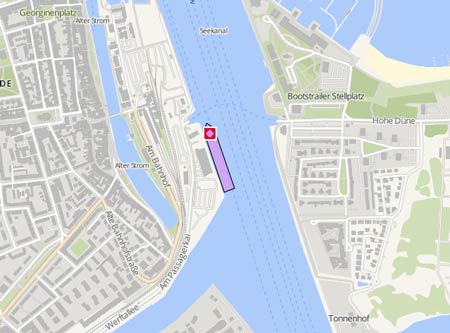STENA EUROPE
Kurs/Position
vor 2 Min
Die letzten Häfen
Die letzten Wegpunkte
Die neuesten Nachrichten
Accident report into engine room fire published
The MAIB has issued an investigation report on the inengine room fire aboard the 'Stena Europe' on Feb 11, 2023, at 9.15 p.n. enm route from Rosslare to Fishguard. The fire caused significant damage to the engine room, while nobody was injured and there was no damage to the environment. The fire was extinguished by the crew. The fire was caused by an uncontrolled release of pressurised fuel. The fuel sprayed onto the exposed exhaust manifold that was operating at a temperature exceeding 220°C when a screw in a two-screw flange within the fuel oil pipework loosened. The fuel oil spray was allowed to reach the hot surface because the joint was not protected by anti-splashing tape or shielding and fuel was able to escape forcefully. The engine manufacturer’s recommended fuel system modification had been fitted to the external fuel system of just one of four main engines. The opportunity to fit the modified flange connection to the external fuel systems on the remaining engines was missed and the risk of fuel leakage remained high. Much of the insulation and shielding on all engines was in a poor state of repair or missing completely. The crew and shore management had become accustomed to this condition over time, possibly due to the age of the vessel, leading to machinery in the engine room being inadequately protected. Stena’s practice of measuring the temperature of running engines using an infrared spot thermometer had not identified the significant hazard posed by temperatures of exposed surfaces exceeding 220°C that still existed post-accident after replacing insulation and shielding. The onboard staff responsible for fuel system inspections on the main engines, which were credited towards a DNV survey, had insufficient awareness of the task, and the planned maintenance system and manufacturer’s manual provided limited guidance. Stena’s SMS did not identify that the requirement for defect reporting in document SMM-0255 was not being met with regard to the problems of recurring leaks. Stena’s management had not fully established the link between recent fires on vessels within the Stena fleet due to fuel leakage and the hazard posed by frequent fuel leaks on three of the four main engines on board Stena Europe, so missed the opportunity to initiate the manufacturer’s recommended upgrade from the two-screw to the four-screw flange connections. Safety issues not directly contributing to the accident that have been addressed or resulted in recommendations It can be difficult to demonstrate compliance with the requirement of MSC.1/Circular.1321 to identify areas with a surface temperature exceeding 220°C. The use of thermographic equipment rather than spot thermometers to conduct surveys would improve hot spot identification and facilitate the IMO requirement for running machinery checks to ensure the insulation covering the heated surfaces has been properly reinstalled or replaced. The chief engineer put themselves and others at risk when they entered the main engine room without wearing PPE or BA despite a fully protected team being on its way to the scene. On Feb 13 the Stena Line Ltd. has issued a fleetwide safety flash (Annex A), highlighting the need to assess hot spots and properly risk assess any maintenance jobs with the potential to cause oil to spray. Stena’s management encouraged the use of the thermal imaging cameras already on board all Stena vessels for the purpose of regular hot spot monitoring and detection in machinery spaces. It modified the external fuel piping on ME3 to incorporate four-screw flanges and repaired or replaced the shielding and lagging around the external fuel systems and hot surfaces and fitted anti-splashing tape to all joints on the low-pressure fuel systems on all of Stena Europe’s operational engines. On June 7, 2023, the company engaged a third-party contractor to undertake a SOLAS compliance verification thermographic survey following ME3’s return to service on May 17. It has undertaken a review of its company SMS and implemented a review process to manage service bulletins and technical service letters from all manufacturers of main engines and auxiliary engines within the Stena fleet. Full report: https://safety4sea.com/wp-content/uploads/2024/12/UK-MAIB-Stena-Europe-Engine-Room-Fire-2024_12.pdf
Stabbing on board
The British police arrested a man on board the 'Stena Europe' last week after it emerged that a dispute between two staff members had resulted in a stabbing. The ferry was getting ready to set sail for Rosslare Europort when the incident occurred. Words were exchanged by two staff members working on the car deck and one stormed off to his cabin returning with a spanner and a knife. The perpetrator first threw a spanner at the victim, believed to be from Dublin, before chasing him and stabbing him twice in the back and slicing him across the chin. Other colleagues immediately leapt to separate them and police and ambulances were called. One man was arrested, while the other was rushed to hospital. The ship was subsequently delayed disembarking while police carried out enquiries and made the arrest.
Refurbished ferry had technical hitch
The return of the "Stena Europe" to the Fishguard-Rosslare run has been delayed by a last-minute hitch. The ferry, which has been undergoing an extensive refit and life extension in Turkey since March, was originally meant to return to Fishguard Port in June. But Stena subsequently revealed that ‘unforeseen issues’ had delayed its return, resulting in the smaller "Stena Nordica" continuing to act as a replacement vessel on the Fishguard to Rosslare crossing. Following a brief stopover at Liverpool’s Cammell Laird dockyard, via Gibraltar, for a continued planned work in dock, the "Stena Europe" finally arrived back in Fishguard in the morning of Sep 30. Due to an unforeseen technical issue the ship was not yet back in service.
News schreiben

